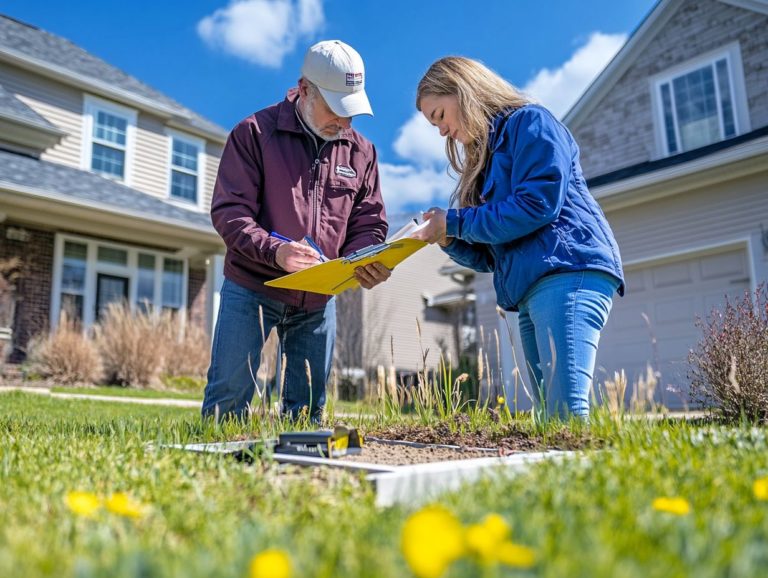Understanding Home Inspection Reports
A home inspection report is your secret weapon in the real estate market! Whether you re a first-time buyer or a savvy investor, this document can change everything. It offers a detailed overview of a property’s condition, pinpointing key components and potential issues that could affect your decision-making.
By familiarizing yourself with the terminology and findings within the report, you ll be equipped to make informed choices and negotiate effectively with sellers. This guide breaks down the essentials of home inspection reports, covering everything from their purpose to selecting a qualified inspector, ensuring you are thoroughly prepared for your property journey.
Contents
- Key Takeaways:
- What is a Home Inspection Report?
- Key Components of a Home Inspection Report
- Interpreting the Findings
- Understanding the Language and Terminology
- Common Issues Found in Home Inspection Reports
- Identifying and Addressing Potential Problems
- How to Use a Home Inspection Report
- Negotiating with Sellers and Making Informed Decisions
- Choosing a Qualified Home Inspector
- Frequently Asked Questions
- What is a home inspection report?
- Why is it important to understand a home inspection report?
- What information is typically included in a home inspection report?
- How long does it take to receive a home inspection report?
- Can I attend the home inspection and ask questions?
- What should I do if I don’t understand something in the home inspection report?
Key Takeaways:

A home inspection report is a detailed document that provides important information about the condition of a property and can help buyers make informed decisions. Understanding the basics of home inspection reports is crucial for interpreting and addressing any potential issues found.
It is important to choose a qualified home inspector and use the report to negotiate with sellers and determine the best course of action for the property.
What is a Home Inspection Report?
A home inspection report is a detailed document crafted by a qualified home inspector. It offers a thorough evaluation of a property’s condition, making it essential to understand the basics of home inspections at a specific address.
This report plays a crucial role in real estate transactions. It illuminates areas of concern, safety issues, and potential significant problems that could impact the home s value.
By reviewing this report, you can make well-informed decisions before committing to a purchase. This ensures you re fully aware of what lies beneath the surface.
Definition and Purpose
The purpose of a home inspection report is to deliver a clear evaluation of a property’s condition, which helps you understand home inspection standards and pinpoint potential flaws and safety concerns.
This detailed document is essential in the real estate process. It serves as a transparent guide for prospective homeowners like yourself.
By emphasizing critical aspects such as structural integrity, which means how strong and stable the structure is, plumbing issues, and electrical safety, it enables you to make informed decisions.
The report acts as a valuable tool during negotiations. You can leverage the findings to request necessary repairs or adjustments to the selling price.
In essence, it transforms your buying experience by providing a thorough commentary on property conditions. This ultimately fosters trust between you and the seller.
Key Components of a Home Inspection Report
A home inspection report encompasses several essential components that provide you with valuable insights into the property’s condition. It includes detailed evaluations of various home systems, highlights areas of concern, and offers professional recommendations for necessary repairs. To better understand this process, learn more about what to expect in a home inspection report.
Areas Covered and Information Provided
In a home inspection report, you’ll find insights into critical systems essential to the safety and functionality of the property, including plumbing, electrical, and the overall exterior condition. For a deeper insight, consider understanding the process of home inspections.
Each of these components plays a crucial role in assessing the home’s well-being. For instance, plumbing inspections examine the state of pipes, water heaters, and drainage systems.
Meanwhile, the electrical assessment scrutinizes the integrity of wiring, outlet functionality, and panel safety. The exterior evaluation takes a close look at the roofing, siding, and stability of the foundation.
By grasping the conditions of these systems, you can uncover valuable insights into existing or potential major issues. This knowledge enables you to make well-informed decisions, steering clear of unexpected repairs down the line.
Interpreting the Findings

Interpreting a home inspection report involves a keen understanding of the specific terminology and language employed. It also requires a thorough analysis of the visual inspection results.
This scrutiny will spotlight any safety concerns or defects within the home, enabling you to make informed decisions.
Understanding the Language and Terminology
Understanding the language and terminology used in home inspection reports is essential for you as a buyer. This knowledge allows you to fully grasp the inspection report summary and decode the meaning behind various inspection codes, providing insight into the home inspection process.
Being well-versed in this terminology enables you to make informed decisions, as certain terms can signal potential issues that might not be immediately concerning at first glance. For example, the difference between ‘minor repair needed’ and ‘urgent action required’ can significantly influence how you perceive the condition of the home.
When you re equipped with insight into industry terms, you can leverage the findings from the inspection more effectively during negotiations, whether it s about the price or repair requests. This approach ensures that your actions are guided by professional recommendations rather than emotional reactions.
Ultimately, familiarizing yourself with common inspection terminology not only helps you understand better but also boosts your confidence throughout the purchasing process.
Common Issues Found in Home Inspection Reports
In home inspection reports, you ll frequently encounter common issues that warrant your attention:
- Safety concerns
- Structural problems
- Deficiencies in electrical and plumbing systems
Each of these factors can significantly influence the property’s overall value, making it crucial to address them thoughtfully.
Identifying and Addressing Potential Problems
Identifying and addressing potential issues during a home inspection can save you from significant future expenses. Various major concerns may be highlighted in the inspection recommendations.
For example, uncovering hidden water leaks or faulty electrical systems can drastically alter your negotiation strategy, giving you leverage to request repairs or price cuts before finalizing the sale.
By proactively tackling these concerns, you protect your investment and enhance the overall value of the home.
Presenting a thorough inspection report to the seller can place you in a more advantageous position during negotiations, ensuring you won’t face costly repairs after the purchase.
This proactive approach boosts your confidence and strengthens your standing in a competitive market.
How to Use a Home Inspection Report
Use a home inspection report effectively to gain a significant advantage in negotiations with sellers. This tool helps you make informed decisions about money to cover repairs and addressing any deficiencies identified in the report, ultimately enhancing your position in the transaction.
Negotiating with Sellers and Making Informed Decisions

Negotiating with sellers using insights from the home inspection report enables you to make informed decisions grounded in the repair estimates and concerns highlighted in the document.
By meticulously reviewing each section of the inspection findings, you can identify specific issues that may warrant further discussion. This approach illuminates areas requiring immediate attention and lays the groundwork for your negotiation strategies.
For instance, referencing repair costs derived from the inspection report can be a game-changer, persuading sellers to either lower the sale price or agree to cover certain repairs before closing.
Effective communication throughout this process allows you to articulate your priorities clearly, facilitating a mutually beneficial agreement while fostering transparency and trust between both parties.
Choosing a Qualified Home Inspector
Don’t settle choose a qualified home inspector for the best chance at a successful purchase! Selecting a qualified home inspector is essential for guaranteeing a comprehensive inspection process. This choice enables an expert evaluation of your prospective property, ensuring you receive trustworthy recommendations that aid your decision-making.
Ready to make your home-buying journey smoother? Start your inspection process today!
What to Look for in a Home Inspector
When searching for a home inspector, it’s essential to consider their qualifications. Look for certifications, field experience, and their ability to provide clear, actionable inspection recommendations.
These elements play a vital role in shaping the thoroughness of the inspection report. A detailed report can profoundly influence your understanding of the property’s condition. An inspector with a good understanding of home systems such as plumbing, electrical, and roofing is more likely to identify issues that others might miss.
Strong communication skills help the inspector present complex findings clearly. This ensures you are well-informed throughout the process.
Ultimately, selecting an inspector with a reputable background and keen attention to detail can provide invaluable insights into any potential repairs or future maintenance needs.
Frequently Asked Questions
What is a home inspection report?
A home inspection report is a detailed document that outlines the condition of a property. It includes any potential issues or defects and is typically conducted by a professional home inspector. For those involved in real estate transactions, understanding the home inspection process provides valuable information for buyers, sellers, and homeowners.
Why is it important to understand a home inspection report?

Understanding a home inspection report is crucial because it gives you a clear picture of the property’s condition. This knowledge can help you make informed decisions about buying, selling, or maintaining a home. For more insights, refer to this guide on understanding home inspection reports, which also allows you to address potential issues before they become major problems.
What information is typically included in a home inspection report?
A standard home inspection report includes details on the property’s exterior, interior, structure, plumbing, electrical, heating, and cooling systems. It may also include photos, notes, and recommendations from the home inspector.
How long does it take to receive a home inspection report?
The time it takes to receive a home inspection report can vary depending on the property’s size and complexity. In most cases, you can expect to receive the report within 24-48 hours after the inspection has been completed.
Can I attend the home inspection and ask questions?
Yes! As a buyer or seller, you have the right to attend the home inspection and ask questions. You should definitely attend the inspection! It s your chance to spot issues firsthand and ask the inspector for clarification or additional information.
What should I do if I don’t understand something in the home inspection report?
If there is something in the home inspection report that you don’t understand, don’t hesitate to ask the inspector for clarification. They are there to help and can provide you with more information or recommendations on how to address the issue.
In conclusion, choosing the right home inspector is crucial for understanding the condition of a property. Don t hesitate to reach out to a qualified home inspector with any questions you may have!






